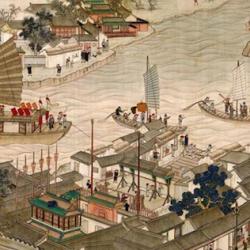In a TLS review of several recent books on China, Gavin Jacobson highlights the role of geography and history in the formation of contemporary Chinese politics.
Geography first: “China is enclosed within 14,000 miles of land borders and a 9,000-mile sea edge. Twenty countries lie next to it, including peer powers, like Russia and India, and smaller, yet historically turbulent states such as North Korea.” China is boxed in on all sides.
Then history: “In the 1920s . . . the League of Nations was regarded by the Chinese as an instrument for treaty revision. In the nineteenth century, European powers led by the British had secured a range of privileges and possessions that were codified in treaties signed by the Qing dynasty. China became the fictional sovereign of a divided nation, as settlements like the Treaty of Nanjing, signed at the end of the First Opium War in 1842, forced it to relinquish the city of Hong Kong, and open a number ports to British traders. By 1900 foreigners controlled vast swathes of the country, including Hong Kong and the Yunnan countryside in the south-west.”
The result was a Balkanized China: “by 1917, a Chinese man or woman could walk across Tianjin and pass through a Japanese, a French, a British and then a German concession. Crossing to the northern bank of the Hai River would bring you to the Belgian quarter, before you reached the Russian, Italian and Austro-Hungarian districts.”
More distant history is also crucial: “China has seen itself as an empire rather than a country. Emperors divided the world into the civilized (those who accepted the hegemony of the Central Kingdom) and the uncivilized (those who didn’t). . . . Between the Tang dynasty (618-907) and the end of dynastic rule in 1912, the guiding axiom of Chinese international relations was the belief in its natural dominion over everything under heaven (tian xia).”
In short, Jacobson argues that “the signature drives behind China’s self-image and its foreign policy: the persistent memory of national humiliation on the one hand, and the historic claims to imperial supremacy on the other.”











